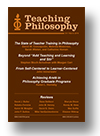|
articles |
|
1.
|
Teaching Philosophy:
Volume >
36 >
Issue: 2
Emily Esch
A Cognitive Approach to Teaching Philosophy
abstract |
view |
rights & permissions
| cited by
Our knowledge of how the mind works is growing rapidly. One area of particular interest to philosophy teachers is research on reasoning and decision making processes. I explore one model of human cognition that offers new ways of thinking about how to teach philosophical skills. The bulk of the paper is dedicated to exposition of the model and the evidence that supports it; at the end of the paper, I suggest ways these findings might be incorporated into the classroom.
|
|
|
|
|
2.
|
Teaching Philosophy:
Volume >
36 >
Issue: 2
Stephen Finn
Using Psychology Experiments in Introductory Philosophy Courses
abstract |
view |
rights & permissions
| cited by
In this paper, I describe a variety of psychology experiments that may be used in introductory philosophy courses not only to grab students’ attention, but also to generate philosophical discussion or to make a philosophical point. The experiments attempt to capture students’ interest in two ways: (1) by posing interesting challenges to students, thereby provoking more active thought in class and (2) by doing something different, thereby increasing attention that naturally follows from change. Although the experiments are psychology experiments, they may still be used to emphasize certain philosophical points or to introduce philosophical topics. The philosophical import of each experiment is quite general, so these exercises are most appropriate for students enrolled in introductory courses.
|
|
|
|
|
3.
|
Teaching Philosophy:
Volume >
36 >
Issue: 2
Elizabeth Jelinek
Using Small Group Learning in the Philosophy Classroom
abstract |
view |
rights & permissions
| cited by
I advocate the use of small group learning in the philosophy classroom because it engages a broad cross-section of students and because it proves to be an effective way to teach critical thinking. In this article, I suggest small group activities that are useful for developing philosophical skills, and I propose methods for circumventing common logistical problems that can arise when implementing small group learning in the classroom. Ultimately, I show that small group learning is a pedagogically powerful and logistically feasible supplement to traditional teaching methods.
|
|
|
|
|
review article |
|
4.
|
Teaching Philosophy:
Volume >
36 >
Issue: 2
Rebecca Copenhaver
Recent Anthologies on Modern Philosophy
abstract |
view |
rights & permissions
| cited by
Four anthologies covering the modern period are reviewed here and assessed with respect to whether anthologized selections and supplementary materials are useful to teachers and undergraduate students. With the exception of one anthology, each volume makes conservative choices in representing the modern period. Such choices reinforce a history of the modern period increasingly out of step with current scholarship and discourage scholarly teachers from presenting a history deeply embedded in science, psychology, education, economics, religion, mathematics, and social, political and moral philosophy. Each of the volumes has significant strengths when used in a curriculum guided by this more conservative canon, but the canon itself is problematic as an organizing principle for anthologies and curricula covering the modern period.
|
|
|
|
|
reviews |
|
5.
|
Teaching Philosophy:
Volume >
36 >
Issue: 2
Vance Cope-Kasten
"The Purpose of Life: An Eastern Philosophical Vision," by Carlo Filice
view |
rights & permissions
| cited by
|
|
|
|
|
6.
|
Teaching Philosophy:
Volume >
36 >
Issue: 2
Yancy Hughes Dominick
"The Greek Search for Wisdom," by Michael K. Kellogg
view |
rights & permissions
| cited by
|
|
|
|
|
7.
|
Teaching Philosophy:
Volume >
36 >
Issue: 2
Julina Roel Gonzalez
"The Philosophy of Food," edited by David M. Kaplan
view |
rights & permissions
| cited by
|
|
|
|
|
8.
|
Teaching Philosophy:
Volume >
36 >
Issue: 2
Paul Herrick
"How to Become a Really Good Pain in the Ass: A Critical Thinker's Guide to Asking the Right Questions," by Christopher DiCarlo
view |
rights & permissions
| cited by
|
|
|
|
|
9.
|
Teaching Philosophy:
Volume >
36 >
Issue: 2
Ryan Jordan
"A Guide to Asian Philosophy Classics," by Puqun Li
view |
rights & permissions
| cited by
|
|
|
|
|
10.
|
Teaching Philosophy:
Volume >
36 >
Issue: 2
David Lovekin
"Philosophy: A Beginner's Guide," by Peter Cave
view |
rights & permissions
| cited by
|
|
|
|
|
11.
|
Teaching Philosophy:
Volume >
36 >
Issue: 2
Jillian Scott McIntosh
"Philosophy of Mind," 3rd edition, by Jaegwon Kim
view |
rights & permissions
| cited by
|
|
|
|
|
12.
|
Teaching Philosophy:
Volume >
36 >
Issue: 2
Douglas F. Peduti
"Engaging Heidegger," by Richard Capobianco
view |
rights & permissions
| cited by
|
|
|
|
|
13.
|
Teaching Philosophy:
Volume >
36 >
Issue: 2
William Simkulet
"Action, Ethics, and Responsibility," edited by Joseph Keim Campbell, Michael O'Rourke, and Harry S. Silverstein
view |
rights & permissions
| cited by
|
|
|
|
|
14.
|
Teaching Philosophy:
Volume >
36 >
Issue: 2
Basil Smith
"Knowledge," by Ian Evans and Nicholas Smith
view |
rights & permissions
| cited by
|
|
|
|
|
|
|
15.
|
Teaching Philosophy:
Volume >
36 >
Issue: 2
Errata
view |
rights & permissions
| cited by
|
|
|
|
